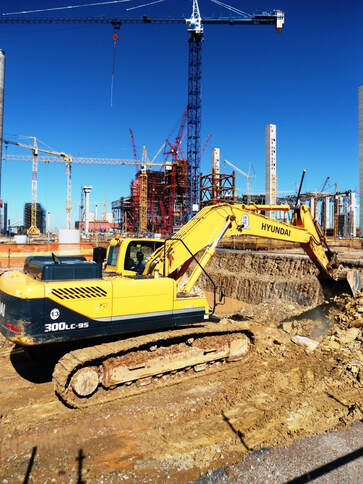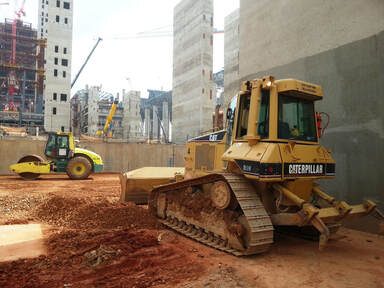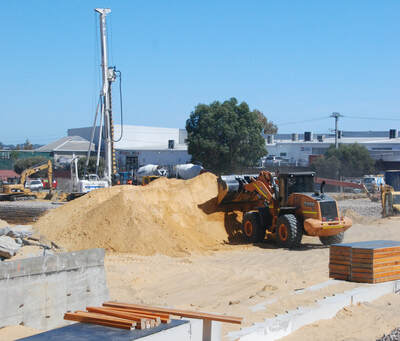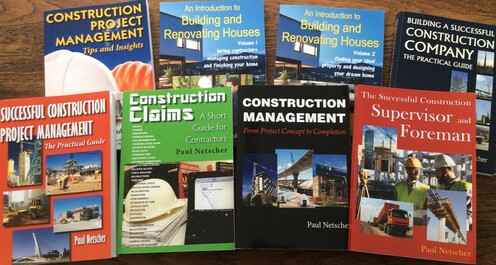|
Choosing equipment for your construction project isn’t as easy as walking into your local equipment dealership and pointing at the one that looks the coolest. A lot of factors go into choosing the perfect machine for the job, such as cost, efficiency, fuel type and operating requirements. One of the most important things to consider when choosing a new piece of machinery is the size. Which size equipment is right for your job? Understand Your Construction ProjectThe first detail to look at is the size and scope of your job. This will vary from project to project — the equipment you need to build a single-family home won’t be the same as the fleet you’ll need to construct a skyscraper or office building. This is one case where size matters, and bigger isn’t always better. If your equipment is too large, you won’t be able to complete the necessary task, or if you can, it will be with some degree of difficulty. It doesn’t take much, especially in the early stages of a project, to swing an oversized excavator bucket right through a wall. If you’re lucky, all you’ll damage is the wall. If you’re not, you could bring the whole roof down on your head. Either way, you’re stuck with costly repairs and looming deadlines because you just had to have the biggest piece of equipment on the lot. It’s like trying to paint a detailed portrait with the largest brush at the store. You might end up with something resembling your project at the end, but it won’t be perfect. You might even end up inadvertently doing more damage with large equipment than you would with properly sized machines. On the other side of the coin, you don’t want to choose something that’s too small for the job. You wouldn’t try to dig a ditch with a spoon, and you shouldn’t try to finish a project with a tool that’s too small. Things to Consider When Choosing Construction EquipmentSize isn’t the only thing you need to consider when choosing construction equipment for your next project. Each type of machinery will have its own factors you’ll need to explore to determine if it’s the best option for a particular project. If you need an excavator to dig a hole or trench, you should assess everything from dig depth and reach length to bucket size and lifting capacity. Sticking with the excavator example, you need to look at size and application. Mini excavators are ideal for crowded worksites, small projects or cases when you’ll need to move your equipment between multiple job sites. Larger excavators become useful for massive projects or cases where a mini version just won’t be enough to do the job. Digging extensive trench work for new utility lines would be a job for a larger excavator. Moving earth to flatten a backyard before installing a deck is a job better suited for smaller equipment. Ask yourself these questions when choosing a new piece of construction equipment:
What Size Equipment Is Right for Your Project?We can offer you all the advice in the world, but when it comes down to it, deciding your equipment size is a very personal decision. What works for one project might not work for someone else on a similar one. Take the time to do your research and figure out which equipment size will work best for you and your goals. Remember that bigger isn’t always better, and sometimes you’ll want to downsize to get the job done. If you keep that in mind, you’ll be fine. Author Bio: Rose Morrison is a freelance writer who covers construction and building design topics. She is also the managing editor for Renovated. Do you want to learn how to manage construction projects successfully?Paul Netscher has written several easy to read books for owners, contractors, construction managers, construction supervisors and foremen. They cover all aspects of construction management and are filled with tips and insights.
Visit to read more. The books are available in paper and ebook from most online stores including Amazon. construction management construction project management
47 Comments
21/1/2021 12:38:30 pm
You made a good point when you shared that it is important to decide on the right size of equipment depending on your project. It is good to bear in mind that bigger is not always the best. I would like to think if a company is thinking of getting heavy equipment, it should consider getting the ones that are in the right size.
Reply
22/1/2021 09:43:34 pm
I really loved reading your thoughts; I like how you point out choosing the right equipments for concrete form contractors ma. I will be sure to bookmark it. Big thanks!
Reply
29/1/2021 03:19:53 am
You made a lot of great points for what to consider when buying construction equipment. I like how you said that it is important to take into consideration the amount of work that needs to be done with the equipment when buying so the project can be as easy as possible. I would imagine that it could be beneficial to invest in an equipment supplier that can help you choose the best supplies for your project.
Reply
9/2/2021 04:31:37 am
It's great that you talked about what to consider before renting heavy machinery. My uncle needs to get a crane for a construction job, but he's not sure which one would be best for the job. I believe that choosing the right equipment for any job is key to its success, and to avoid any accident. I think that he'll find this information very useful. Thanks for your tips about how important it is to choose the right size of heavy equipment for your project.
Reply
13/2/2021 06:45:10 am
My brother has been thinking about getting some extra supplies in order to build a shed because he wants it to be safer. He would really like to get the right materials to build it with a professional. It was interesting to learn about how he should decide what materials he is working with in order to choose the best equipment to work with them.
Reply
26/2/2021 02:51:03 am
I'm glad you mentioned that bigger isn't always better since it can make the early stages of a project more difficult. My brother is looking for an equipment hire service where he can get an excavator to prepare the site for his building consecution. This info should be helpful as he determines what size excavator would be the right fit to hire for the project.
Reply
18/3/2021 12:51:40 pm
Thanks for the construction tips. My husband would like to get an excavator for a project downtown. Since there is limited space on the lot, he should probably get a mini excavator.
Reply
27/3/2021 03:04:12 am
It's great that this article explains that it's important to figure out how much work your project requires. My cousin wants to build a home and choose a quality company to handle the foundation and other work. I'll let him know that he should figure out the amount of work to be done and get help from a construction service that knows how to work with heavy equipment.
Reply
1/4/2021 09:31:27 pm
I need to get a crane for a construction project that I'm working on. It makes sense that I would want to ensure that I get one that's the right size. I'll be sure to get a professional to help me out with this, because I don't want to do things wrong.
Reply
1/5/2021 04:36:48 am
Thanks for the tip to not pay attention to only size when getting construction equipment. Some people think that equipment has to be bigger for a bigger job. But sometimes smaller equipment can help with bigger projects because they are easy to maneuver.
Reply
13/5/2021 03:49:25 am
It was helpful when you said that looking at the size of your job is the first detail to consider. My cousin was at my house for dinner last night, and he was telling me about how his work has a construction project coming up in a couple of weeks, and he wants to make sure that he can choose the right equipment for it. I'll make sure to pass this information along to him as he searches for equipment to get for his work.
Reply
19/5/2021 12:51:29 pm
It's really helpful when you said that we should take the time to do research about the equipment size that will suit our construction needs. My partner and I are planning to renovate our house in June, but we're not familiar with heavy construction equipment. I think we should look for a dealer who can guide us and advise us on what equipment is best to rent.
Reply
29/6/2021 01:46:25 pm
The other day my friend mentioned that he is looking to rent equipment. It is important for us to be mindful of their condition. I will remind my friend accordingly.
Reply
1/7/2021 12:14:30 pm
If you have a budget and you think that you'll need the heavy equipment for often. I think you should consider purchasing it rather than renting it.
Reply
7/7/2021 12:15:15 am
I can see how a business could really benefit from getting the right kind of equipment for their supplies in order to be a lot safer. Getting some help from a professional in order to get the right drills, and angle heads could be really useful. It was interesting to learn about how they should get the equipment that will work for the job, but they should get the right kind of research.
Reply
16/7/2021 08:23:08 am
I can see how a business could really benefit from getting the right kind of equipment for a construction project in order to be a lot more effective. Making sure that they can get some help from a professional could allow them to be more effective with fewer problems. It was interesting to learn about how the type of ground like gravel, or pavement can affect the tires, and what hazards they are dealing with.
Reply
10/9/2021 08:29:51 pm
Before starting any replacement or repair you have to be sure to get the roof checked by the organization properly. Never forget to tell your expectations to the company so that they can make the work as per your desires.
Reply
17/9/2021 09:34:17 pm
In the construction industry, choosing the right equipment should not just be based on the project but rather on assessing what the project needs.
Reply
We introduce ourselves as construction equipment manufacturers and exporters, having rich experience in manufacturing civil construction equipment including construction machinery like Skid Steer machine with various attachments like Trencher, Auger, Pallet Fork. Gamzen also have Reversible Drum Mixers, Mobile Batching Plant, Pilling Tools, Piling Winch Machine Etc.
Reply
4/10/2021 08:29:37 pm
Thank you for the tip about analyzing the amount of space available to complete a project. I think it is important to have the right equipment that can not only do a job, but also fits with the space you have to work with. It would be a good idea to consult with a professional before deciding on what equipment you need to do a job.
Reply
3/11/2021 04:07:36 pm
You made an excellent point that when looking to rent construction equipment, it is important that we consider the extent of the project. That way, we can decide on the most suitable size of the equipments for us to rent. I think I will look through my construction plan before I decide on which equipment to rent.
Reply
15/11/2021 08:32:30 pm
Excellent explanation. Anyone can easily comprehend since it’s simple & focused. Keep up the great work!
Reply
18/11/2021 01:47:42 am
Thank you for bringing up how you need to think about how much space you have to work with. My friend was telling me that she is thinking about getting an excavator for a project. I wonder what size she'd be able to use in the space that's available.
Reply
Thanks for helping me understand that weight limits and capacities will be a huge part of the piece of equipment that you would need. With that in mind, it would be best to talk to a professional regarding the things we need for the construction of the shed we want in the backyard. Once we know what they need to construct it, we will personally go to a hardware store that we can find to get the right tools for the project.
Reply
2/12/2021 07:52:00 am
It's good to know that weight limits and capacities play an important role in what equipment to choose. I'm thinking about renting some heavy equipment for a project at work. I'll have to contact some different companies to see what price I can get.
Reply
28/12/2021 02:30:18 pm
I loved it when you said that one of the most important things to consider when choosing a new piece of machinery is size. We have plans to construct an office building for commercial purposes. Good to know this article gives us the full idea on how to avail for the best equipment hire in the country.
Reply
13/1/2022 10:37:30 pm
The right size equipment for your construction project has a direct impact on productivity, safety, and the bottom line.
Reply
I appreciate that you explained that it is important to consider the right size of the equipment you need. I have a cousin who is looking for a construction equipment rental for their upcoming project and asked if I have any idea what is the best option to do. You did a good job of explaining that consulting a trusted construction equipment rental company can help them with all their concerns.
Reply
29/1/2022 08:18:00 am
I love that you talked about the importance of having the proper equipment and materials for the project for better production. My best friend is looking for engineering solutions for the 3D printing design of a commercial property they want to have, and he asked if I had any suggestions. Thanks to this useful article, I'll be sure to tell him that he can consult a well-known heavy equipment design services as they can answer all his inquiries.
Reply
15/7/2022 08:36:33 pm
It really helped when you said that we should know the size and scope of the construction project we will have to choose the right piece of equipment to use. I can imagine how it would definitely be important when you also need gas skid rentals for a part of the processes the project will have. In that case, you should consider working with a professional to get the best outcome by ensuring that the equipment is the right fit for what you need them for.
Reply
24/8/2022 07:16:11 am
Thanks for mentioning that you need to consider the amount of space you have to work before renting equipment. My husband and I want to build a pool in our backyard, but we'll need to hire an excavator. Hopefully, we can hire one sometime this week.
Reply
4/1/2023 09:30:57 am
Thank you for pointing out that you shouldn't buy or hire the biggest piece of equipment if you're operating in a small area. My friend requires construction equipment for his new home. I'll advise him to be mindful of measuring his available space before renting construction equipment.
Reply
26/3/2023 05:05:15 pm
I liked it the most when you shared that mini excavators are perfect for packed worksites. My friend told me that their project involves
Reply
12/4/2023 01:13:31 pm
I never knew that having the appropriate equipment could help implement a safe production project. My best friend mentioned last night that he was planning to hire a skid steer loader for his construction sites' different tasks. He asked if I had any idea where could be the best option to consider. Thanks to this informative equipment tips article. I'll be sure to tell him that he can consult a well-known equipment rental service as they can provide information about their services.
Reply
24/4/2023 06:42:00 pm
What Size Equipment is Right for Your Construction Project on PN Project Management's blog is an informative article for anyone involved in construction work. The author provides helpful tips for selecting the right size equipment for your project, taking into account factors such as the scope of the project and the type of work being done. I appreciated the section on the importance of considering the site conditions and accessibility when choosing equipment.
Reply
25/4/2023 03:37:48 pm
Choosing the right size equipment for a construction project is a crucial decision that can impact the project's efficiency and success. I appreciate the factors and considerations outlined in this article, such as the scope of the project, the terrain, and the budget. As someone who has managed construction projects before, I can see how this article can be a helpful resource for anyone who is facing this decision.
Reply
19/5/2023 12:14:58 am
Choosing the right equipment size for your construction project is crucial for efficiency and cost-effectiveness. Assessing the specific requirements of your project, such as scope, timeline, and site conditions, will help determine the ideal equipment size. Whether it's excavators, bulldozers, or cranes, opting for the appropriate size ensures optimal performance, minimizes downtime, and maximizes productivity. Don't underestimate the importance of proper equipment sizing, as it directly impacts project success. Plan meticulously, consult professionals if needed, and make informed decisions to ensure your construction project runs smoothly and efficiently.
Reply
23/9/2023 03:17:58 pm
This blog post delves into a fundamental aspect of construction planning that often determines the success and efficiency of a project - selecting the appropriate equipment size. As someone who has been involved in various construction projects, I can't stress enough how crucial this decision is.
Reply
7/10/2023 05:09:02 pm
This blog post explores a fundamental element of construction planning that frequently plays a pivotal role in the outcome and effectiveness of a project: the choice of the right equipment size. Drawing from my experience in numerous construction projects, I cannot emphasize strongly enough the significance of this decision.
Reply
13/10/2023 09:34:36 pm
Choosing the right equipment size is crucial for a successful construction project. It's important to consider the scope of work, site conditions, and project timeline. This article provides valuable insights and tips to help construction managers make informed decisions. Well done!
Reply
16/10/2023 03:58:15 pm
I found this article on choosing the right equipment for construction projects really helpful! It's so important to match the equipment size to the specific needs of the project to ensure efficiency and safety. Thanks for sharing these valuable insights!
Reply
23/10/2023 09:46:44 pm
Great post! Choosing the right equipment for a construction project is so important. It can save time, money, and ensure safety on the site. I always make sure to assess the specific needs of the project and consult with experts if necessary. Thanks for sharing these tips!
Reply
18/11/2023 05:40:38 pm
Thank you for the advice not to buy construction equipment based solely on its size. Some people believe that larger equipment is required for larger jobs. However, because smaller equipment is easier to operate, it can sometimes assist with larger jobs.
Reply
25/11/2023 09:47:32 pm
Superb post! Selecting the appropriate tools for a building project is crucial. In addition to ensuring site safety, it can save time and money. I always make sure to evaluate the project's particular requirements and, if needed, seek the advice of experts. I appreciate you giving these suggestions!
Reply
17/3/2024 02:55:12 pm
Excellent article, talked about the heavy machinery and choosing the right equipment for the project. hanks for sharing this valuable inputs.
Reply
4/4/2024 07:31:02 pm
I couldn't agree more with the emphasis on understanding the scope of the project. It's not just about opting for the biggest machine available, as that could lead to costly mishaps and delays. Conversely, undersized equipment might compromise efficiency and safety
Reply
Leave a Reply. |
Archives
June 2024
Note: We welcome genuine comments, especially comments that add additional information to the subject matter in the article. We however reserve the right to remove inappropriate comments, which includes comments that have nothing to do with the subject, comments that include inappropriate language, and comments that are an advertisement for a product or company, or which include an advertising link. Comments must be in English. We will not enter into discussion on why a particular comment was removed.
CategoriesCopyright 2016 - The attached articles cannot be reproduced for commercial purposes without the consent of the author.
The opinions expressed in the attached articles are those of the writer. It should be noted that projects are varied and different laws and restrictions apply which depend on the location of the contractor and the project. It's important that the reader uses the supplied information taking cognisance of their particular circumstances. The writer assumes no responsibility or liability for any loss of any kind arising from the reader using the information or advice contained herein. "I have what I consider some of the best books on construction management."
Books are available from: Amazon.com Amazon.co.uk takealot.com kalahari.com Amazon.in Amazon.de Amazon.fr Amazon.it Amazon.com.au Powell's Fishpond uread bokus Amazon.ca Amazon.es Other retail stores Available in paperback or on Kindle "28 YEARS OF CONSTRUCTION PROJECT MANAGEMENT EXPERIENCE, DEVELOPING SUCCESSFUL CONSTRUCTION PROJECT MANAGERS AND BUILDING SUCCESSFUL CONSTRUCTION COMPANIES"
|








 RSS Feed
RSS Feed




